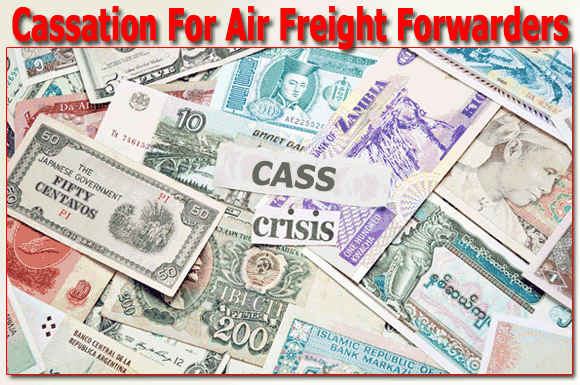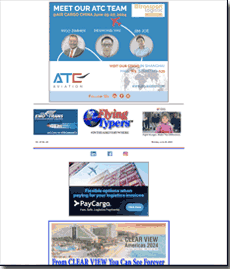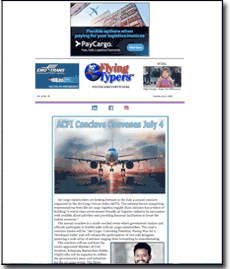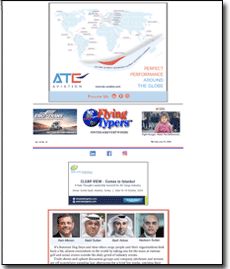IATA has been providing settlement
systems to the industry since 1971,
but lately the landscape has changed.
Here we separate the wheat from the
chaff, and present the complete story about where air cargo is today
with CASS, representing all sides with no unknown or unidentified
sources.
We're informed, so you be informed.
|
 |
 At 12.55 CET on May 21st 2022 I wrote a
message to Brendan Sullivan (right), asking a few questions as
arranged at the FIATA Headquarters’ meeting, where he had been one
of FIATA’S key speakers. One question ran as follows: “At
FIATA’s you said that cooperation is the keyword, but many in the
forwarders’ arena complain that there is seldom a peer-to-peer relationship
and there have been questions on this point. Do you think airlines would
prefer a less fragmented market in the forwarding sector than there actually
is today so that cooperation can be easier?”
At 12.55 CET on May 21st 2022 I wrote a
message to Brendan Sullivan (right), asking a few questions as
arranged at the FIATA Headquarters’ meeting, where he had been one
of FIATA’S key speakers. One question ran as follows: “At
FIATA’s you said that cooperation is the keyword, but many in the
forwarders’ arena complain that there is seldom a peer-to-peer relationship
and there have been questions on this point. Do you think airlines would
prefer a less fragmented market in the forwarding sector than there actually
is today so that cooperation can be easier?”
There was a precise reason for such question.
On August 12th 2021 an old friend had sent me a video, where B. Sullivan
was interviewed, with the following comment: “In this 25 minutes’
interview with IATA’s Head of Cargo, the word “Forwarder”
was pronounced just one time, and that was when he spoke about enforcing
rules and penalise those who do not adhere to regulations.”
The video is no longer available on the internet, so I am no longer able
to verify by watching it again, but I remember the comment did not sound
out of place.
In the ensuing conversation, I noted: “interestingly
the word forwarder was placed close to the concept of those who deliberately
flout the rules: not a good way to assess the relationship. It was also
very interesting to hear Sullivan’s reaction to the idea of ‘fragmented
industry’: he sounded embarrassed to disclose his preference for
an industry that is totally integrated,” i.e. an industry where
protecting the interests of the airlines is easier. There is no such mention
in IATA’s portal today, but protecting airlines’ interests
was prominently present years ago. In the end this is the reason why IATA
exists and I think it is normal in a free marketplace governed by supply
and demand. By and large airlines are represented by IATA and freight
forwarders by FIATA.
If you are an airfreight forwarder and you
need to deal with airlines, you will sooner or later become acquainted
with the CASS system, which has the task of facilitating payments from
forwarders who buy airlines’ services. This is what IATA writes
on its own website: “Apply to become a CASS Associate: 1) Visit
the IATA Customer Portal. 2) Create an account by clicking on ‘Create
a user’, or log in if you already have an account. 3) Under ‘My
Services’, click on ‘IATA Accreditation & Changes’.
Then choose ‘New Accreditation Application’. 4) Follow the
instructions.
In no time you will understand that there
is one thing to do and that is to follow the instructions. As far as I
know this is one of the few examples where, on a global scale, customers
get instructions from their suppliers’ representative body. In no
time you will understand that there is one thing to do and that is to
follow the instructions. Many of you may have heard or read comments in
recent times about forwarders being frustrated with the CASS system. In
particular, we have read CLECAT’s comments from Brussels here:
Surely CLECAT also read statements made by FIATA’s President Turgut
Erkeskin and Bill Gottlieb from Canada, who is one of FIATA’s Past
Presidents. I am focusing on CLECAT’s comments because, as is typical
for this extremely well managed association, it points to the real problem:
the issue of competition. I am focusing on the real problem here:
The Official Journal of the European Communities
reports a procedure for making the Cargo Agency legit in Europe as far
back as 1990. After financial services were created for the travel industry
in 1971, CASS has been in place for generations, despite dissatisfaction
surfacing every now and then. One could consider CASS a legacy of the
past, from other points of view it can be seen as a raft in the ocean
of disorder that millions of transactions in the open could create. Competition
could actually become pretty fierce if extending to payments and credits.
When Reagan took office in the USA amid
stagflation, he affirmed: “This Administration’s objective
will be a healthy, vigorous, growing economy that provides equal opportunities
for all Americans, with no barriers born of bigotry or discrimination.
Putting America back to work means putting all Americans back to work.
Ending inflation means freeing all Americans from the terror of runaway
living costs. All must share in the productive work of this ’new
beginning,’ and all must share in the bounty of a revived economy.”
(Source: Reagan Foundation)
With those words one of the strongest revolutions
in the U.S. economy took place and indeed the USA sprang out of stagflation,
giving an untested push to the rest of the world. Competition became a
meaningful part of the change and deregulation also heavily impacted the
aviation industry.
The issue of competition is not new in the
extended relationship between airlines and freight forwarders, but is
it just the old problem? Competition is an issue with many faces: there
could be competition within airlines and within freight forwarders, between
airlines and forwarders, rarely vice versa, and even between their associations,
which both run extensive training programmes. The many years FIATA and
IATA spent in discussing a “modernisation” programme were
laborious to say the least and suddenly came to a halt in the period of
the pandemic. Many changes in our time have been ascribed to the pandemic,
but I do not believe this situation applies.
The air cargo modernisation debate started
from the idea to build a global programme that could be similar to the
existing European Air Cargo Programme (EACP), which was considered for
years the benchmark of the industry, other than the CNS which worked only
in the USA. In particular, the EACP was banking on the strong compliance
record of European forwarders and allowed for less “bureaucracy”,
this was the term used informally. There were regular meetings and the
rules even included a sort of veto whereby forwarders could oppose IATA’s
resolutions if considered unacceptable. Other programmes existed elsewhere,
but the EACP was the blueprint for many. The co-existence of these programmes
with CASS has continued for many years, but it is also the source of much
discussion. Air Cargo Programmes have many facets and a complex nature,
but it all boils down to the money, when their destiny approaches CASS.
I know that my idea that the two concepts should be completely separated
has never been taken or even liked . . . but, the longer we continue hearing
complaints the more I remain convinced that the cargo programme and CASS
should fare parallel, but distinct paths.
In our 2021 conversation I added: “The
course of these events is not surprising for me.” As I had anticipated
nine years earlier, IATA eventually pulled the plug, but I had thought
it would take only five years instead of ten for the modernisation programme
to unravel. I also did not think that the Europeans, in view of a global,
brighter future, would relinquish their own coveted freedoms, but they
actually did. Indeed, it took a lot of patience to undo the creature that
had been created in many decades’ negotiations at FIATA’s
Air Freight Institute (AFI). “She sat like Patience on a monument,
smiling at grief. Was not this love indeed?” (Shakespeare,
Twelfth Night, act 2)
One could argue whether forwarders’
love for airlines is unrequited: indeed, at times you have the impression
that the rules imposed on forwarders are unnecessary and even ruthless.
It is in fact true that forwarders have a stellar compliance rate, as
IATA itself confirms. So why is this happening? There is also another
way of looking at this: one could ask whether the enviable compliance
record is the consequence of forwarders’ discipline or the stringency
of the rules imposed by IATA. Maybe a combination of both?
In the meantime, we have repeatedly heard
FIATA state that its members need and want a global air cargo programme,
so work with IATA has been resumed. Considering the busted attempt took
over a decade to just fail, probably this requires more and more patience,
in particular on the forwarders’ side. Will they have it? “How
poor are they that have not patience! What wound did ever heal but by
degrees.” (Shakespeare, Othello, act 2) – so IATA and
FIATA are talking again of a global programme and we hope that their relatively
recent divergence will be composed. This being said, sitting patiently
on a monument may not be conducive to the solution. There must be movement
if you wish to get anywhere. Progress in the market will not wait for
FIATA’s or IATA’s consent.
FIATA is also looking sideways. In the area
of digitalisation, it has made friends with entities that are connected
with payments and compliance. A quick look at FIATA’s website shows
a list of partners who could potentially offer solutions. Many have the
technology and potential to assist. I am unable to understand whether
the audible signs of dissatisfaction with CASS on the forwarders’
side will find a way to create a novel settlement system with airlines,
or even all those freight forwarders’ contractors out there. If
you think of the myriad transactions they make, we are talking of big,
very big money indeed. This is a period when modernisation may actually
come through technology sooner than negotiations. Time will tell.
Marco Sorgetti
|






 Vol.
23 No. 31
Vol.
23 No. 31